Years ago, the late U.S. senator from Wisconsin, William Proxmire — well, he wasn’t the late senator back then — got good political mileage out of presenting his annual “Golden Fleece” awards to public officials who, in his view, wasted taxpayer money.
Winners included the United States Army for funding a study about how to buy Worcestershire sauce; the National Institute on Drug Abuse for an examination of marijuana’s effect on sexual arousal; and the U.S. Postal Service for an ad campaign encouraging us Americans to write more letters to each another.
Wonder what Bill Proxmire would have thought of some recent research at the public University of Illinois?
I, for one, think it was high time light was shone on this subject:
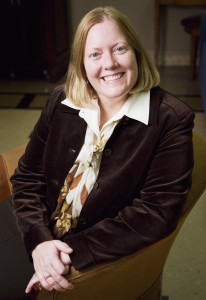
Cele Otnes took a close look at some practices that woo customers. At least that’s what the businesses think and hope. Not all do. (University of Illinois News Bureau)
U of I marketing professor Cele Otnes has been looking into “business rituals” to see if they really help to attract customers. Some observances, she discovered, can backfire if they are insincere, embarrassing, or overdone.
One traditional, well-meaning one, in particular, can drive customers away. It’s the restaurant ritual in which the entire wait staff, the maitre ‘d, the pastry chef, a couple of stray busboys, and the guy who scrapes plates in the kitchen — having been tipped off by a relative or friend that you’re a (48-year-old or 77-year-old) “birthday boy” or girl who’s dining that day — march into the room behind your “server,” Allison or Tyler, who’s carrying a plate on which a candle burns brightly in a piece of “death by chocolate” cake. They circle your table and break into a lusty version of that all-too-familiar song:
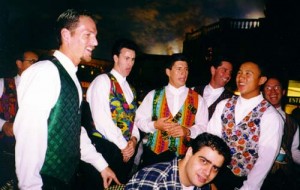
This fellow looks mildly appreciative, though certainly not overjoyed to be serenaded by the wait staff. (jshyun, Flickr Creative Commons)
“Happy birthday to you. Happy birthday to you.
“Happy birthday, dear mm, mm (having no clue as to your first name and relying on others at the table to fill it in).
“Happy birthday to you.”
Professor Otnes found that these rituals can have precisely the opposite effect from what the proprietors intended. The surprise songfests can mortify the “celebrants” and annoy other diners no end. People told Otnes that they found such moments insincere, invasive of their privacy, even “carnivalesque.”
Yup, there’s nothing quite like a boisterous round of “Happy Birthday” at the next table to cap off a romantic candlelight dinner, seal a business deal, or ease the pain of someone who’s just told you that she’s getting divorced or that he has cancer.
Otnes recalls going out to eat with her husband, Mark, one time when a hyperactive waiter cupped his hands in the shape of a megaphone and shouted to the entire dining room that one and all should join in wishing a complete stranger a happy, happy. “And-a one, and-a two, Happy Birthday to you . . . .”
“We’re never coming back here,” Mark told her, above the din. And they have not returned.
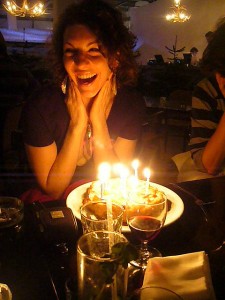
The “happy birthday” sing-along does seem to have pleased this customer. (lightning bolte, Flickr Creative Commons)
Cele Otnes says businesses mean well when they fuss over customers in such public ways. They want to appear friendly, welcoming, attentive, and the patron to feel “special.” Otnes says raucous, badly sung birthday wishes can work in some settings, say a bar where the ambience is lively and loud. People gather for happy hour, after all.
I, for one — and lots of others I know — find most birthday sing-alongs forced, unoriginal, phony, and annoying rote exercises. Other than that, I adore them. Professor Otnes, on the other hand, is an exuberant Aries who says she usually doesn’t mind such rousing good cheer.
So I’d say Cele Otnes’s study isn’t Golden Fleece material at all. In fact, it was deemed significant enough that one of the four colleges of the University of London invited her to present her findings at a consumer-research conference.
That deserves a rousing “Hip, hip, hooray!,” don’t you think? Come on, gang, gather ‘round and join us:
“For she’s a jolly good marketing prof.
“For she’s a jolly good marketing prof.
(You in the back, let’s hear it, now . . .)
“For she’s a jolly good marketing proffffff . . . .
“Which nobody can deny!”
Bay State Top 1,000 996
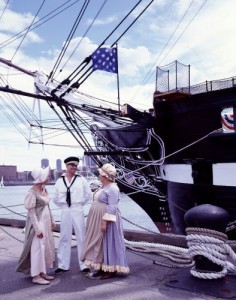
Massachusetts is crammed with history, all right. This is the U.S.S. “Constitution” — called “OId Ironsides” because the wooden ship deflected many a British cannonball in a battle during the War of 1812. (Carol M. Highsmith)
A specially-convened commission in the historically rich New England state of Massachusetts recently embarked upon an ambitious effort, the fruits of which appeared last month.
Unfortunately, the fruits have a spoiled piece or two, and a few are missing.
The Great Places in Massachusetts Commission, a state-appointed group of 12 people, culled 13,000 nominations into 1,000 . . . are you ready? “Great Places in Massachusetts.”
Some who saw the final list doubted that “Mass,” a small state — it ranks 44th out of 50 in size — could possibly have 1,000 great places. It depends on your definition of “great,” of course. The Boston Globe newspaper wondered what could be worthy of a close look at the National Guard Armory in Hyannis, for instance.
Carol and I have visited Massachusetts many times, and while we’ve barely had time to check out 100, let alone 1,000, great places, we can see how there might be that many and more. (We have a low “great” threshold.)
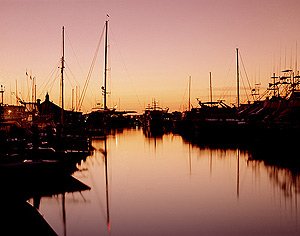
Another splendid dawn breaks over Nantucket Harbor. (Carol M. Highsmith)
The beautiful Berkshire Mountains, for starters. The Cape Cod National Seashore and two quaint islands — Martha’s Vineyard and Nantucket — that ooze tweed and privilege. The Kennedy Family compound, viewable from a distance, in Hyannis Port. Harvard University in Cambridge, and about 60 other leafy college campuses in and around Boston. The Boston Common greensward, and creaky Fenway Park — now the oldest Major League baseball stadium.
And I’m just warming up.
People in reticent Massachusetts itself — already trending toward the skeptical — quibbled plenty about their state’s “Great Places” list, and not just because a few of the 1,000 might be more “OK” than “great.”
A crafty reader COUNTED the entries and found just 996 great places listed. The commissioners should have known that cyberspace is full of sleuths who have nothing better to do than to tally the exact count of great places. Makes you wonder if four were eliminated, and what might have been wrong with them.
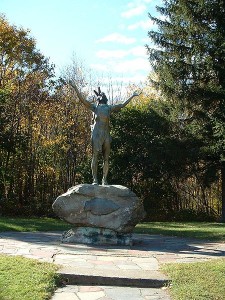
Joseph Pollia’s ‘Hail to the Sunrise’ statue in Claremont on the Mohawk Trail depicts a warrior looking to the east with arms lifted the Great Spirit. (Wikipedia Commons)
Some attractions on the list exist — but in another town. The “Hail to the Sunrise” statue, for instance — now we’re talking great — is not in the town of Florida, Massachusetts, as the list at first averred. When the Globe pointed this out, the Great 1,000 Commission moved the statue to Charlemont, where it belongs.
Only the most determined tourist from Missouri or South Dakota would drive all the way to Massachusetts just to see the National Yiddish Book Center in Arlington, Massachusetts; the Sachem Rock Farm in East Bridgewater; or LaLaJava, whatever that is, in Northborough. They’re all on the list of the Great 996.
The “Great” commission points out that the idea was to get folks right there in the Bay State to go see new places. “Under this theory,” wrote the Globe’s Sam Allis, “someone in Everett may wake up on Sunday and say, ‘Honey, what do you say we hit Bash Bish Falls?’”
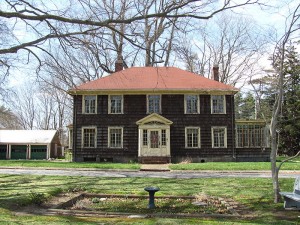
Even though New England is plenty rocky, they don’t farm rocks at Sachem Rock Farm, and never have. The name comes from a famous rock marker behind the house. (John Phelan, Wikipedia Commons)
Not only was the list of the commonwealth’s great places 4 short of 1,000, but someone did some actual, physical, checking and found that some of the sites were closed, had been repurposed into something that bears no resemblance to a tourist attraction, or don’t even exist any more.
The Baker-Robinson refinery in New Bedford, for instance, had been a true historical gem. New Bedford was once the hub of the nation’s whaling industry, and the refinery processed whale oil, which at one time lit the lamps of the land. Unfortunately, the building has been gutted and is being converted to a hotel.
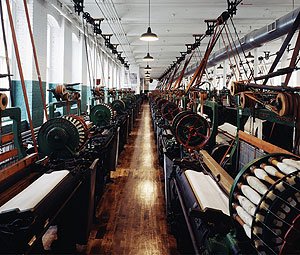
Fortunately the exquisitely restored Boott Cotton Mill, part of the Lowell National Historical Park that preserves some of the artifacts from Massachusetts’ days as the nation’s textile giant, is still going strong. (Carol M. Highsmith)
I know the feeling, since I sometimes rave about a wonderful place that Carol and I have explored, only to find that it closed in 1997, collapsed from termite damage, or was turned into a factory that makes fingernail clippers.
Erik Turkington, a former state representative, led the effort to compile Massachusetts’ much-maligned list of “greats.” He told the Boston Herald that he wished he had “proofread one more time.”
Maybe, the sometimes-snarky Web site bostonist.com remarked, “This explains why Turkington is a former state rep.”
Oh, well. At least every one of Massachusetts’ 351 cities and towns, just about, had something worthy enough to make the “Great” list.
One request:
Please don’t tell Texas about any of this. We’d be here until the next passing of Halley’s Comet, in 2061, reading that list of what Texas considers “great.”
By the way, to save you the trouble, I checked on “LaLaJava.” As you might have guessed, it’s a coffeehouse — a couple of them actually. An online reviewer reports that the original location in Shrewsbury is “in a dumpy little building.” Must be the décor or the coffee that’s “Great.”
Ted's Wild Words
These are a few words from this posting that you may not know. Each time, I'll tell you a little about them and also place them into a cumulative archive of "Ted's Wild Words" in the right-hand column of the home page. Just click on it there, and if there's another word that you'd like me to explain, just ask!
Megaphone. A cone-shaped object, held against the mouth, that amplifies the human voice.
Reticent. Not just quiet, but actually averse to talking.
Worcestershire sauce. A spicy brown sauce, first bottled in Worcestershire, England, that contains vinegar, molasses, and — believe it or not — a touch of anchovy paste.

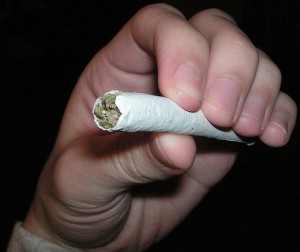

One response to “Happy Birthday, Whatsyourname”
Aw, this was a real good content. Actually I’d like to write like that as well – taking time and true energy to produce a high quality posting… however what can I say… I put things off an awful lot and by no means appear to get anything accomplished…